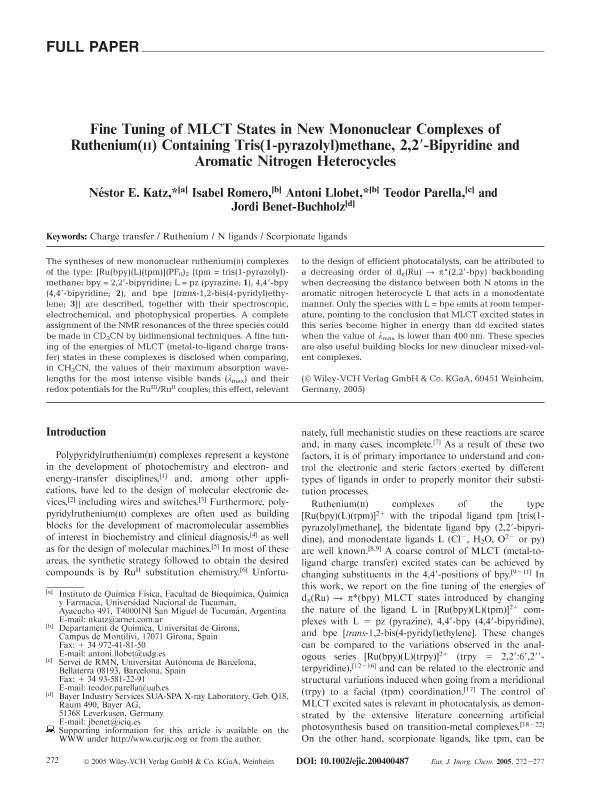Mostrar el registro sencillo del ítem
dc.contributor.author
Katz, Néstor Eduardo

dc.contributor.author
Romero, Isabel
dc.contributor.author
Llobet, Antoni
dc.contributor.author
Parella, Teodor
dc.contributor.author
Benet Buchholz, Jordi
dc.date.available
2020-03-13T14:56:19Z
dc.date.issued
2005-01
dc.identifier.citation
Katz, Néstor Eduardo; Romero, Isabel; Llobet, Antoni; Parella, Teodor; Benet Buchholz, Jordi; Fine tuning of MLCT states in new mononuclear complexes of ruthenium(II) containing tris(1-pyrazolyl)methane, 2,2′-bipyridine and aromatic nitrogen heterocycles; Wiley VCH Verlag; European Journal of Inorganic Chemistry; 2; 1-2005; 272-277
dc.identifier.issn
1434-1948
dc.identifier.uri
http://hdl.handle.net/11336/99467
dc.description.abstract
The syntheses of new mononuclear ruthenium(II) complexes of the type: [Ru(bpy)(L)(tpm)](PF6)2 {tpm = tris(1-pyrazolyl)-methane; bpy = 2,2′-bipyridine; L = pz (pyrazine; 1), 4,4′-bpy (4,4′-bipyridine; 2), and bpe [trans-1,2-bis(4-pyridyl)ethylene; 3]} are described, together with their spectroscopic, electrochemical, and photophysical properties. A complete assignment of the NMR resonances of the three species could be made in CD3CN by bidimensional techniques. A fine tuning of the energies of MLCT (metal-to-ligand charge transfer) states in these complexes is disclosed when comparing, in CH3CN, the values of their maximum absorption wave-lengths for the most intense visible bands (λ max) and their redox potentials for the RuIII/Ru II couples; this effect, relevant to the design of efficient photocatalysts, can be attributed to a decreasing order of dπ(Ru) →*(2,2′-bpy) backbonding when decreasing the distance between both N atoms in the aromatic nitrogen heterocycle L that acts in a monodentate manner. Only the species with L = bpe emits at room temperature, pointing to the conclusion that MLCT excited states in this series become higher in energy than dd excited states when the value of λmax is lower than 400 nm. These species are also useful building blocks for new dinuclear mixed-valent complexes. © Wiley-VCH Verlag GmbH & Co. KGaA, 69451 Weinheim, Germany, 2005.
dc.format
application/pdf
dc.language.iso
eng
dc.publisher
Wiley VCH Verlag

dc.rights
info:eu-repo/semantics/openAccess
dc.rights.uri
https://creativecommons.org/licenses/by-nc-sa/2.5/ar/
dc.subject
CHARGE TRANSFER
dc.subject
N LIGANDS
dc.subject
RUTHENIUM
dc.subject
SCORPIONATE LIGANDS
dc.subject.classification
Química Inorgánica y Nuclear

dc.subject.classification
Ciencias Químicas

dc.subject.classification
CIENCIAS NATURALES Y EXACTAS

dc.title
Fine tuning of MLCT states in new mononuclear complexes of ruthenium(II) containing tris(1-pyrazolyl)methane, 2,2′-bipyridine and aromatic nitrogen heterocycles
dc.type
info:eu-repo/semantics/article
dc.type
info:ar-repo/semantics/artículo
dc.type
info:eu-repo/semantics/publishedVersion
dc.date.updated
2020-03-11T18:35:54Z
dc.journal.number
2
dc.journal.pagination
272-277
dc.journal.pais
Alemania

dc.journal.ciudad
Weinheim
dc.description.fil
Fil: Katz, Néstor Eduardo. Universidad Nacional de Tucumán. Facultad de Bioquímica, Química y Farmacia. Instituto de Química Física; Argentina. Consejo Nacional de Investigaciones Científicas y Técnicas. Centro Científico Tecnológico Conicet - Tucumán. Instituto de Química del Noroeste. Universidad Nacional de Tucumán. Facultad de Bioquímica, Química y Farmacia. Instituto de Química del Noroeste; Argentina
dc.description.fil
Fil: Romero, Isabel. Universidad de Girona; España
dc.description.fil
Fil: Llobet, Antoni. Universidad de Girona; España
dc.description.fil
Fil: Parella, Teodor. Universitat Autònoma de Barcelona; España
dc.description.fil
Fil: Benet Buchholz, Jordi. Bayer Industry Services; Alemania
dc.journal.title
European Journal of Inorganic Chemistry

dc.relation.alternativeid
info:eu-repo/semantics/altIdentifier/url/https://onlinelibrary.wiley.com/doi/full/10.1002/ejic.200400487
dc.relation.alternativeid
info:eu-repo/semantics/altIdentifier/doi/https://dx.doi.org/10.1002/ejic.200400487
Archivos asociados
